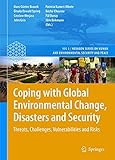Coping with Global Environmental Change, Disasters and Security : Threats, Challenges, Vulnerabilities and Risks / edited by Hans Günter Brauch, Úrsula Oswald Spring, Czeslaw Mesjasz, John Grin, Patricia Kameri-Mbote, Béchir Chourou, Pál Dunay, Jörn Birkmann.
Tipo de material: TextoSeries Hexagon Series on Human and Environmental Security and Peace ; 5Editor: Berlin, Heidelberg : Springer Berlin Heidelberg, 2011Descripción: LI, 1815 páginas recurso en líneaTipo de contenido:
TextoSeries Hexagon Series on Human and Environmental Security and Peace ; 5Editor: Berlin, Heidelberg : Springer Berlin Heidelberg, 2011Descripción: LI, 1815 páginas recurso en líneaTipo de contenido: - texto
- computadora
- recurso en línea
- 9783642177767
- GE1-350
Springer eBooks
Forewords -- Dedications -- Acknowledgements -- Prefaces -- Part I Introduction: Concepts of Security Threats, Challenges, Vulnerabilities and Risks -- Part II Securitization of Global Environmental Change -- Part III Economic, Social, Environmental Security and Human Threats, Challenges, Vulnerabilities and Risks in the Near East, North and Sub-Sahara Africa and in Asia,- Part IV Threats, Challenges, Vulnerabilities and Risks for Urban Centres in Hazards and Disasters -- Part V Coping with Global Environmental Change: Climate Change, Soil and Desertification, Water Management, Food and Health -- Part VI Coping with Hazards and Strategies for Coping with Social Vulnerability and Resilience Building,- Part VII Coping with Global Environmental Change: Scientific, International, Regional and National Political Strategies, Policies and Measures -- Part VIII A Technical Tool: Remote Sensing, Vulnerability Mapping and Indicators of Environmental Security Challenges and Risks -- Part IX Towards an Improved Early Warning of Conflicts and Hazards -- Part X Summary and Conclusions -- Abbreviations -- Bibliography -- Biographies of Contributors -- Index. .
This policy-focused Global Environmental and Human Security Handbook for the Anthropo-cene (GEHSHA) addresses new security threats, challenges, vulnerabilities and risks posed by global environmental change and disasters. In 6 forewords, 5 preface essays 95 peer reviewed chapcountries analyse in 10 parts concepts of military and political hard security and economic, social, environmental soft security with a regional focus on the Near East, North and Sub-Sahara Africa and Asia and on hazards in urban centres. The major focus is on coping with global environmental change: climate change, desertification, water, food and health and with hazards and strategies on social vulnerability and resilience building and scientific, international, regional and national political strategies, policies and measures including early warning of conflicts and hazards. The book proposes a political geo-ecology and discusses a ‘Fourth Green Revolution’ for the Anthropocene era of earth history.
Para consulta fuera de la UANL se requiere clave de acceso remoto.


